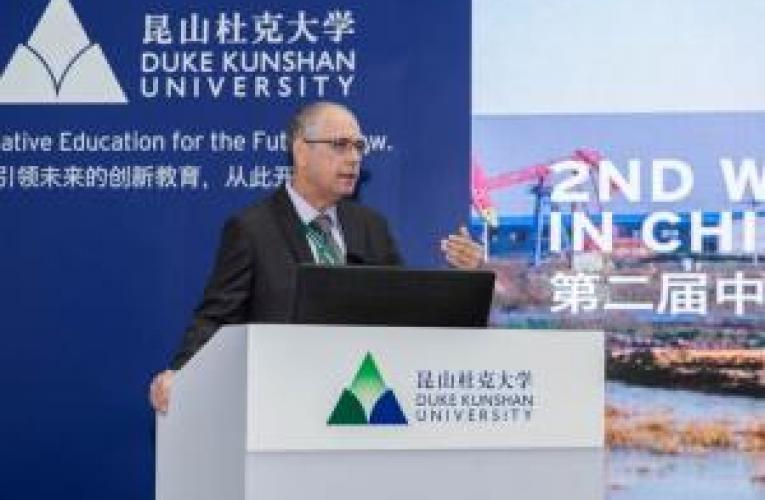DURHAM, N.C. – Researchers, policymakers, environmental managers and other stakeholders gathered at Duke Kunshan University for a two-day workshop last week to explore the potential impacts of increased unconventional energy exploration on China’s water supply.
About 100 people attended the 2nd Water-Energy in China Workshop, Oct. 14-15. The event featured presentations by some of the world’s leading experts in the fields of water quality, geochemistry, environmental engineering, resource economics and environmental policy

(Photo Credit: Jay-Shen Jie)
The rapid growth of unconventional energy exploration – especially shale gas and tight sand oil – has the potential to transform water and energy economies globally. For China, the onset of unconventional shale gas exploration has the potential to alter China’s dependence on coal and reduce its greenhouse gas emissions. Yet unconventional shale gas exploration brings with it an array of environmental and regulatory challenges, especially high rates of water use and the generation of large volumes of wastewater.
 To explore these issues, participants at the workshop reviewed the latest scientific findings on the risks posed by oil and gas wastewater to China’s water supply, based on recent U.S. experiences. They also learned about new water treatment technologies that could help reduce these risks, and legal and regulatory policies that will be needed to help China navigate a safe transition from coal-based energy production to unconventional energy development. (Photo Credit: Jay-Shen Jie)
To explore these issues, participants at the workshop reviewed the latest scientific findings on the risks posed by oil and gas wastewater to China’s water supply, based on recent U.S. experiences. They also learned about new water treatment technologies that could help reduce these risks, and legal and regulatory policies that will be needed to help China navigate a safe transition from coal-based energy production to unconventional energy development. (Photo Credit: Jay-Shen Jie)
Avner Vengosh, professor of geochemistry and water quality at Duke and Duke Kunshan; Marc Deshusses, professor of civil and environmental engineering at Duke and Duke Kunshan; and Erika Weinthal, Lee Hill Snowdon Professor of Environmental Policy at Duke, co-chaired the workshop and presented at it.
Other presenters included scientists and managers affiliated with 15 Chinese research institutions, three U.S. universities and one Israeli university.
“Feedback was very positive. Our goals were to spur the exchange of ideas, establish Duke and Duke Kunshan as resources that Chinese stakeholders can trust on water and energy issues, and lay the foundation for future research collaborations,” Vengosh said. “I feel we definitely succeeded on all counts.”
You can view the workshop agenda and list of presenters online here.
###
